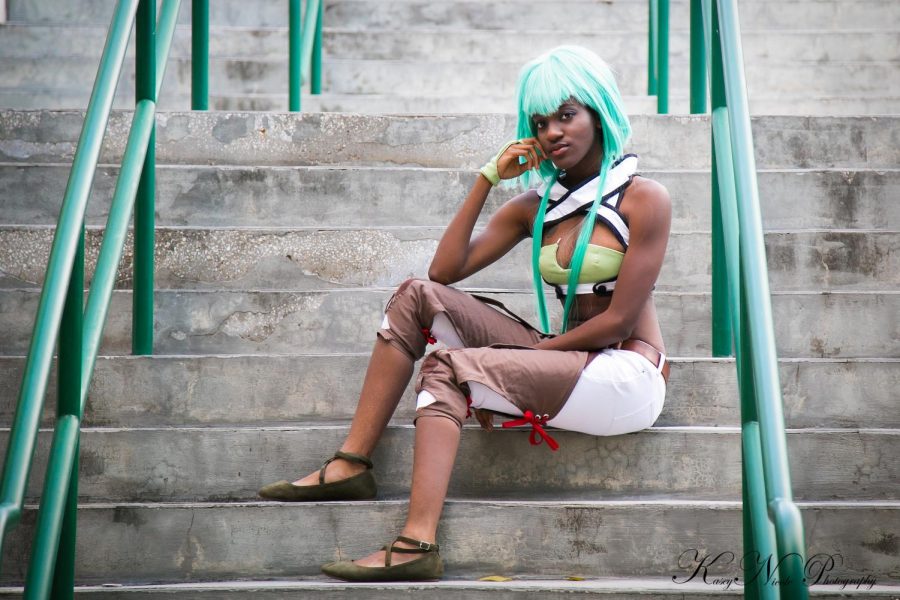Students find creative outlet in cosplay
Photo courtesy of Chante Knight
Chante Knight dresses up as Emerald from the animated Rooster Teeth series: RWBY at the Holiday Matsuri anime convention in Florida. Knight, graduate student in FAA, uses her experience with cosplay and sewing in her studies as a costume technology student.
Nov 26, 2018
Gillian Lange, freshman in LAS, began cosplaying in middle school when she and a friend dressed up as chibi Italy and chibi Romano from the anime show “Hetalia” for Halloween.
Her love for anime and video games drove her to cosplay more seriously throughout high school and now in college.
Cosplay, or costume play, is the act of dressing up as characters from anime, video games or other entertainment franchises, often for different local conventions. Cosplayers either make their own costumes or buy them online.
Chante Knight, graduate student in FAA and part of the MFA tech program, has cosplayed for 10 years. Knight makes herself elaborate costumes as a tribute to her favorite anime characters. Her love for making costumes, discovered through cosplay, prompted her to study costume technology at the University.
“When I decided to go to school for (costume technology), it kind of came about in a roundabout way, but my love of cosplaying did inadvertently help me find avenues to costume technology,” Knight said.
Get The Daily Illini in your inbox!
Knight prides herself on the quality of her work, paying close attention to intricate details. She has been commissioned to create other people’s costumes for cosplay over the years. However, her rigorous schedule has caused her to set some boundaries.
“I have actually cut back the amount of outside commissions that I was doing over the years because it is very demanding to (have) a hobby that is sewing and also essentially a job that is sewing,” Knight said. “It’s really hard. Everything blurs into one line.”
Rae Melnik, senior in FAA, is also a cosplayer and costume design student. Melnik has been able to apply techniques learned in school to cosplay.
“In terms of cosplay, I definitely have a better eye for things now,” Melnik said. “I have a better eye at what (exact) fabric the clothing is made out of, what kind of sewing techniques were made in creating it, why is something there that is usually not there.”
Cosplayers come from a variety of backgrounds. Heather McNaughton, freshman in LAS, likes that she can exercise her creativity through cosplay and challenge herself in her STEM studies. However, McNaughton hasn’t always been confident in sharing her hobby.
“Up until recently, I was one of those people that was like, ‘Are people going to think I’m weird?’” McNaughton said. “Most of my friends in high school didn’t even know that I cosplayed.”
Despite her initial worries, McNaughton now uses cosplay as an avenue for self-expression.
“Cosplay really lets me show the world the characters I love or who I relate to or who I want to be like,” McNaughton said. “It also lets me show and express myself by being able to make things that I love and that I’m proud of and that really makes me happy to create them.”
Others use cosplay as a way to express identity. Melnik, who identifies as non-binary, sees cosplay as an opportunity to honor favorite characters, display craftsmanship and explore gender identity.
“There is a general consensus that you should cosplay characters that you do like, not cosplay characters you don’t like,” Melnik said.
The cosplay community faces its own set of challenges. As a black cosplayer, Knight said she has not personally been discriminated against, but she has seen more famous black cosplayers face backlash.
“One of the phrases that really bothers me when it comes to cosplaying is, ‘Oh, you’re a great cosplayer for a black person.’ Why does my race matter? It shouldn’t matter,” Knight said. “What should matter is the quality of work I’m doing, not the fact that I’m black.”
Lange acknowledged the collective cosplay community has issues to work through but said it is generally a positive place.
In the digital age, many cosplayers find their community online through social media and in person at conventions. However, there is a lack of concentrated cosplay community on campus. Lange is trying to change that.
Lange is starting a performance group for the TV show and video game “Love Live!” Individuals in the group would each be assigned a character, and they would collectively practice different lip-syncing and dancing numbers to perform at competitions at cosplay conventions.
Lange hopes to start a monthly cosplay workshop where everyone from novice to expert cosplayers are welcome to learn to build armor or to sew. Lange has seen the benefits of the cosplay community and wants to bring that to more people on campus.
“One thing I’ve noticed throughout the cosplay community is one of the reasons we do it is to boost our self-confidence, and it makes us forget the stresses that are happening, and it makes us relax and just feel at ease with everything,” she said.






